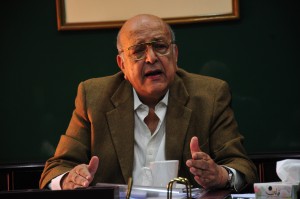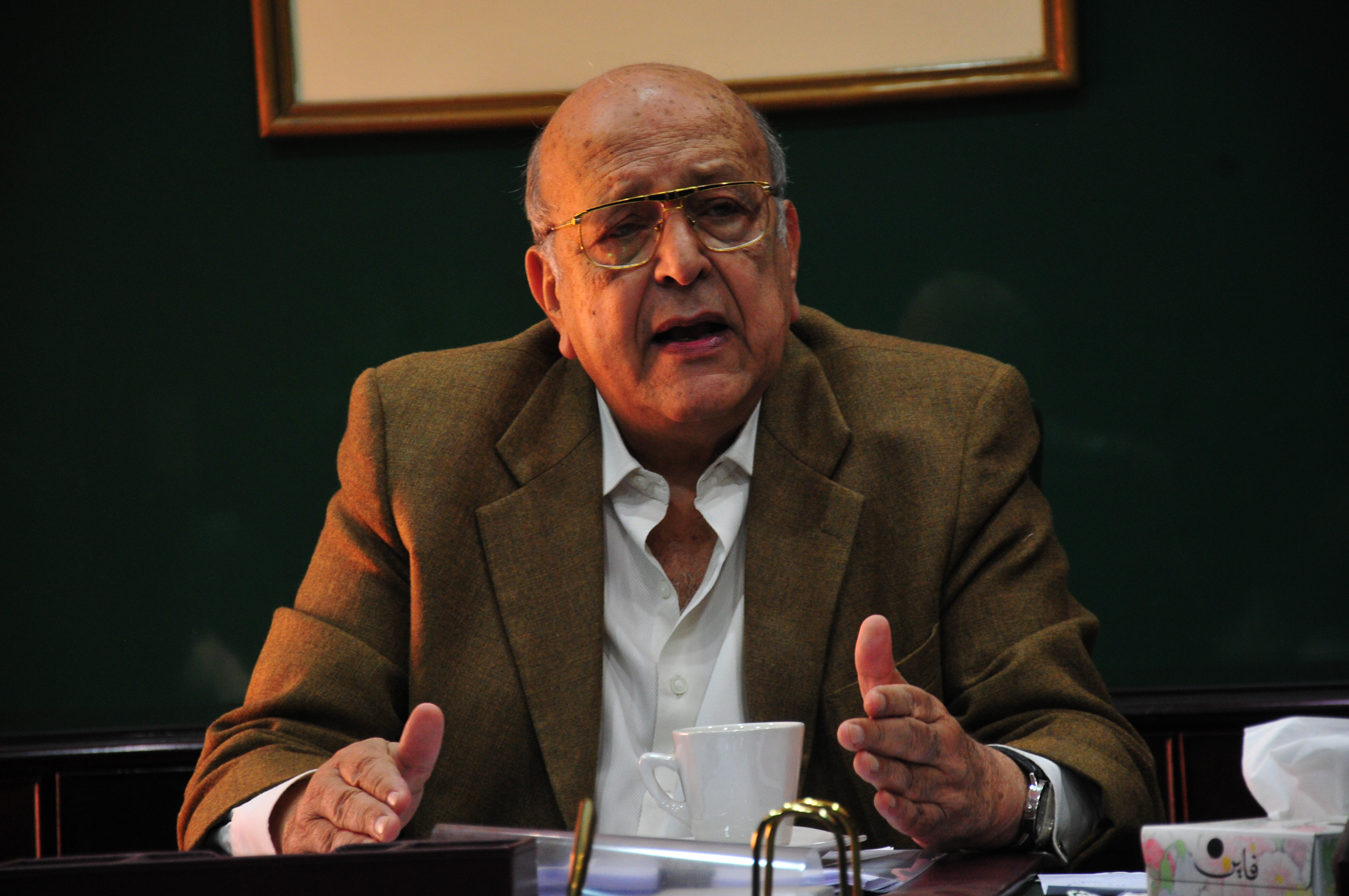
How critical is Egypt’s current economic standing?
I think there can be no argument that the situation is grave. It’s been two years and the situation is progressing from bad to worse every day.
Tourism has been severely damaged; employment and prices in this sector are down. Consequently all the industries and businesses related to tourism (restaurants, cafes, souvenir shops, etc.) have seen a significant drop in business. In Aswan, which relies almost entirely on tourism, locals complain that while the environment there is conducive to tourism, tourists fail to show up because Cairo is the primary hub for all touristic activities in Egypt. And since it is the source of most of the political instability, it is not surprising that tourism in other regions is suffering as well.
In regards to industry, the latest statistics demonstrate that 2,200 factories have been closed, production is down, merchandise sales are down, and unemployment is on the rise. When we look at the reasons for why this is happening we find that the most significant cause is due to the breakdown in labour relations in recent years. Employees seem to exact retribution from employers at will and are now able to hold them hostage. Why would any businessman invest in such a climate?
Other factors driving this decline in manufacturing include the intermittent suspension of activities in ports as well as robberies and hijacking of container trucks. The construction sector has been one of the hardest hit industries in the country due to the collapse of the local real estate market. Investors are reluctant to participate and are biding their time, which in turn leads to no activity in the market. At the same time, regional and foreign investors are not developing new projects, while the government’s financial calamities are preventing it from establishing infrastructure development projects.
What are the business community’s greatest fears at this time?
It is the lack of a clear vision for the future, because a businessman takes risks; they don’t gamble. Analysing and assessing risk requires insight and a vision for the future, which is not present at the moment. For instance, you will notice that foreign investors would never buy an office in Egypt but will only lease, because leasing facilitates exit strategies. This strategy is increasingly being adopted by local and regional investors across all sectors due to the high risk envisioned for the future. What it comes down to is that business and finance cannot function in a climate of political and social instability coupled with a lack of security.
What is leading businessmen to lose faith in the courts’ ability to settle grievances is the breakdown of the legal system caused by increased persecution by the ruling party. The prosecutor general, forcibly appointed by President Mohamed Morsy, is in conflict with his own staffers. Even worse is the attack on the leader of the Judges’ Club Ahmed Al Zind, which drives investors to lose confidence in the state’s ability to provide security as well as its institutions.
What are your comments on the perceived indecisiveness of the government?
The government has been stunted by indecisiveness since the revolution and the prosecution of ministers that began under the government of former Prime Minister Essam Sharaf and continued under former Prime Minister Kamal El-Ganzoury, up until today. These prosecutions have led to an atmosphere of fear among the cabinet ministers of the post-revolution transitional period, who hesitate to sign their names to a policy or a decision for fear of being prosecuted after the lapse of their tenure. The ministers who have been found guilty of corruption were not considered criminals before the revolution, but they are now due to their unpopularity in the media. The legal system interpreted their decisions to be corrupt thus leading to their incarceration, hence scaring subsequent ministers from taking any meaningful action.
There are those who defend the new government’s plan, and believe it will be able to meet the current economic challenges, do you agree with this?
If there was any concrete planning we would have heard of these changes in policy ahead of time, but instead, we hear of new taxation without any planning or any consultations taking place. This leaves the citizen unable to react and adjust in a meaningful way and just when the shock caused by this policy-change wears off, the policy itself is cancelled. This flip-flopping by the government is better demonstrated when discussing the changes in gas prices. The government announced its decision to raise fuel prices and the reaction was one of instant panic. Because the government couldn’t allow the citizen to gradually adjust to this change, the government reversed its decision, further fuelling the panic which resulted in a feeling of lack of confidence. As a businessman, I cannot build a venture when there is no clarity in policymaking and a lack of a clear vision for the future.
What is the current role of the Egyptian Businessmen Association (EBA)?
The EBA was formed under President Anwar El-Sadat during his privatisation policies, and it included representatives from all sectors of the economy such as retail, construction and information technology. Membership regulations require all members to have spent at least 15 years in a leadership position in their company in addition to having a reputation beyond reproach. That is why no corruption charges have ever been brought against a member of the EBA since its formation.
The purpose and role of the EBA from the time of its formation to this day is to explore and diagnose problems facing different economic sectors and then relay our findings to the government. We work with the government in multiple ways that include exploring economic legislation, researching current legislation that could hamper the nation’s economic development, and discussing alternatives with the government.
Has that occurred in recent times?
It is happening all the time and is an on-going process.
Do you see the proposed bundle of tax reforms as essential for the resurgence of the economy?
In my opinion, the most necessary measure for the resurgence of the economy is creating a clear plan of action. These reforms were retracted a day after they were announced. Furthermore, these reforms were part of the International Monetary Fund’s conditions to approve the $4.8bn loan, which amounts to pandering by the government. All of these factors reveal a lack of clarity and an absence of an effective plan with clearly marked deadlines, targets and timeframes. It is necessary for the formation of this plan to include the input of economists and qualified individuals from all factions and positions in the country. They may include government officials, ministers, members of parliament, and members of any political party; Egypt is not lacking in talent and ingenuity in the fields of economics and finance.
Did you believe that the constitution should determine the economic identity of the nation?
I do not think it should, because circumstances change and so there must be versatility in the constitution to allow for the economy to adapt. For example, Nasser had instituted certain policies that defined the economic identity of the country which were overturned by Sadat. If these initial policies were enshrined in a constitution, it would have caused a massive political crisis in an attempt to adapt the economy to its new circumstances. From what I know of the Constitution of the United States, it contains a smaller number of articles than that of the Egyptian Constitution. A constitution should only deal with necessities and the most basic of issues.
The new constitution ties production to income. Do you agree with that?
Yes, I think it is absolutely necessary to ensure fairness in the workplace. A worker cannot demand a higher salary if he or she cannot produce, and an employer cannot deny a wage increase for deserving, highly productive workers.
Do you think that still applies even if the cause of a company’s losses is not its labour force?
That would mean tying income to revenues instead of production. I am not going to wait for the company’s revenues to determine the wages of the employees. You get as much as you put in regardless of the profits and losses of the company. If a worker produces 8 shoes and the global average for shoe production is 10, then the worker’s salary should be less than the average worker’s salary abroad. If that worker’s production rate is 10 shoes and the global average is 9, then the worker should be paid more than what the average worldwide worker receives. A worker is not responsible for the company’s sales, but for its production. Thus, compensation for his labour should be tied with the revenues.
What do you think of the constitutional articles that pertain to the economy?
To be honest I have not read the constitution due to the controversy and strife it seems to have caused.
But surely some of the sections dealing with the economy have come to you attention.
No, they haven’t. I have intentionally avoided reading the document because how put off I was by the circumstances of its formation and the rushed manner by which it was prepared and introduced to the public. What is ridiculous to me is that the one concession everyone can agree on is that the constitution should be amended in some way or another. I fail to see the reason for not being prudent and waiting for a resolution to these minor differences so that the constitution can be ratified with an overwhelming majority and with the consent of most political factions.
Do you think there are those in the ruling party that can help propel the economy past its current turmoil?
I think it the role of every political leader to try and attract qualified and talented people, regardless of their political affiliations in order to help salvage the situation.
That did not seem evident during the current cabinet’s formation.
But this cabinet has been designated as “transitional,” hence temporary, until the formation of a parliament. We will see then what talents will come from this new government.

Recently, we have seen an increase in acquisitions by Arab and regional banks of local financial houses. Do you think that will have a negative impact, if any?
I don’t think it will have any negative impact at all since these banks that have been acquired were French owned. French investors are trying to leave Egypt, and the Arab investors are trying to take their place. This is causing balance and a state of equilibrium in the market. To me, the impact is limited impact because, despite the fact that capital generated by both these investors doesn’t go to the Central Bank or the pockets of the citizens, their operations still remain in Egypt, which is beneficial.
So you don’t think we are entering a new era where investment in Egypt would be dominated by Arab investors?
I do not. This has occurred before. One of the leading cell phone telecommunications companies operating in Egypt is Arab. Capital knows no religion, culture or nationality.
What about the flow of foreign investment and attracting back investors?
They won’t come as long as the political chaos continues, and that chaos includes the endless demonstrations, the attack on the judiciary system of the country, the closing of ports and valuable infrastructure facilities, and violence and kidnappings.
But you were just stating that for the vacated investments, new ones are being attracted to operate in Egypt such as those from Qatar and the UAE.
These investments entered Egypt but are not being channelled to the Egyptian people. The acquisitions by departing and incoming foreign investors are between themselves. The transactions are being handled abroad. But who would open a manufacturing facility here? As a matter of fact, Egyptians have begun investing and manufacturing abroad, in places such as Turkey and China.
Can the growing disparity between the Egyptian pound and the US dollar help the struggling real estate market in Egypt?
More important than the currency fluctuations is the lack of investments coming into the country because it is in grave peril. There is no point in discussing the issue unless the major underlying problems of the country can be resolved. As for the exchange rate, the Central Bank is trying to ensure that the price of the US dollar doesn’t rise exponentially compared to the Pound.
But the Central Bank has reached a point where it can no longer peg the Pound to the Dollar.
That is why if we don’t get a handle of these underlying issues first, the dollar might climb to an unreasonable price.
Do you see the government’s decision to allow private companies to import natural gas as a positive move?
Of course it is a positive move, even though this changes us from a gas-exporting nation to an importing one. The reality is that we are facing an energy crisis in the country due to the growing demographic and economic pressures that result from a growing population. There is nothing wrong with importing energy to meet local demands, especially when you notice that this is an essential aspect of the policies of developed nations. Japan, for example, imports all of its energy supply and it remains a highly developed nation.
But I’m referring to the private sector in specific taking over the role of the importer of natural gas.
I don’t perceive an issue with this. I hope the private sector can have a leading role in all major economic functions to relieve the government from these burdens, allowing it to focus on national security, education, and all the functions of protecting Egyptian citizens. This is evident when the Ministry of Electricity complained that it was the only importer of energy into the country and took concrete steps to change that.
Do you think that the government has the ability and mechanisms to regulate importation of energy by the private sector?
I think the government can and should play the role of the economic supervisor and stop attempting to unnecessarily control every aspect of the economy. This oversight will allow important regulation. It should initiate mechanisms to regulate energy imports similar to the way it regulates the telecommunications industry.
Wouldn’t that lead to a duality of prices in the market?
As a businessman, I am completely against any duality of prices in the market as this will strengthen the black market economy.
If you were to advise the government, what would you say?
The government needs to lifts its controls on production and distribution and be satisfied will the role of monitoring and regulating the economy. It should grant the private sector greater freedoms in managing the economy, but it should remain vigilant and punish all corrupt acts and other wrong doings by the private sector according to the full extent of the law.
If a subsequent government comes up with a clear vision and path to navigate the future, how fast can the country bounce back from its problems?
I predict that it will bounce back really fast. If this strategy is carefully and meticulously planned and well-researched and the government is not afraid to communicate and relay its plan to the people, then the recovery can be achieved in a fast yet steady manner. You must not forget Egypt’s potential and position in the world. Contrary to rumours, the world wishes Egypt all the success, as it is a stabilising force in the region. If Egypt collapses, the negative repercussions on international trade will be immense. There is no shortage of companies and nations that will assist Egypt as long as Egyptians do their part to bring themselves out of this calamity.
What is your opinion on Prime Minister Hesham Qandil’s efforts at this time?
I cannot accurately judge his effort because his government is only a temporary and transitional one.
While there can be little disagreement on the merits if economic and tax reformation, many are afraid it might cause a massive public backlash. How can we resolve this problem?
The people of Egypt have been misled by the political elite, during the period directly after the overthrow of President Hosni Mubarak’s regime, to believe that all the stolen wealth and fruits of the corrupted economy will be restored to the people without effort. This false hope has led to the people resenting any tough decisions and pains they might have to endure to fix the economy. The road ahead will be tough but it must be taken. The more the country delays in taking these tough measures the worse the symptoms of the time will be.
Rebuilding the institutions that can stabilise the country will take time, how can we halt haemorrhaging investments in the mean time?
Well, we need to prioritise the institutions that are able to do this for the sake of expediency. The judicial system needs to be restored to its full functionality and that can be achieved in a matter of days. As long as the current government fails to allow this, there can be little hope for a bright future for investments in Egypt.




